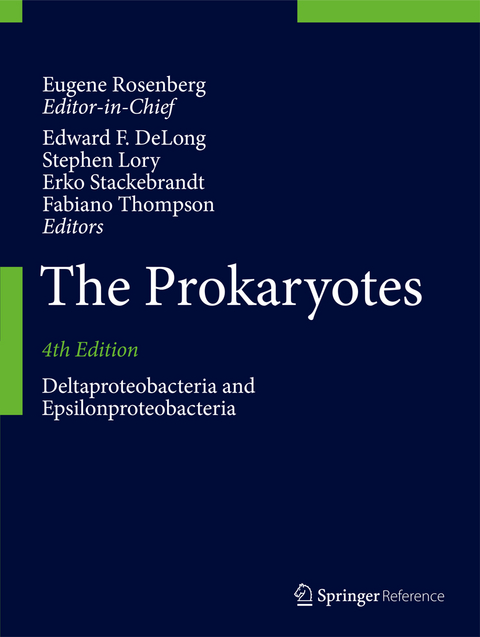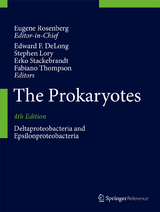The Prokaryotes
Springer Berlin (Verlag)
978-3-642-39043-2 (ISBN)
The Prokaryotes is a comprehensive, multi-authored, peer reviewed reference work on Bacteria and Achaea. This fourth edition of The Prokaryotes is organized to cover all taxonomic diversity, using the family level to delineate chapters.
Different from other resources, this new Springer product includes not only taxonomy, but also prokaryotic biology and technology of taxa in a broad context. Technological aspects highlight the usefulness of prokaryotes in processes and products, including biocontrol agents and as genetics tools.
The content of the expanded fourth edition is divided into two parts: Part 1 contains review chapters dealing with the most important general concepts in molecular, applied and general prokaryote biology; Part 2 describes the known properties of specific taxonomic groups.
Two completely new sections have been added to Part 1: bacterial communities and human bacteriology. The bacterial communities section reflects the growing realization that studies on pure cultures of bacteria have led to an incomplete picture of the microbial world for two fundamental reasons: the vast majority of bacteria in soil, water and associated with biological tissues are currently not culturable, and that an understanding of microbial ecology requires knowledge on how different bacterial species interact with each other in their natural environment. The new section on human microbiology deals with bacteria associated with healthy humans and bacterial pathogenesis. Each of the major human diseases caused by bacteria is reviewed, from identifying the pathogens by classical clinical and non-culturing techniques to the biochemical mechanisms of the disease process.
The 4th edition of The Prokaryotes is the most complete resource on the biology of prokaryotes.
The following volumes are published consecutively within the 4th Edition:
Prokaryotic Biology and Symbiotic Associations
Prokaryotic Communities and Ecophysiology
Prokaryotic Physiology and Biochemistry
Applied Bacteriology and Biotechnology
Human Microbiology
Actinobacteria
Firmicutes
Alphaproteobacteria and Betaproteobacteria
Gammaproteobacteria
Deltaproteobacteria and Epsilonproteobacteria
Other Major Lineages of Bacteria and the Archaea
Eugene Rosenberg, Professor of Microbiology at Tel Aviv University, Israel; Edward F. DeLong, Professor at Department of Civil and Environmental Engineering & Department of Biological Engineering, Massachusetts Institute of Technology, Cambridge, MA, USA; Fabiano Thompson, Professor at Center of Health Sciences, Federal University of Rio de Janeiro, Brazil Stephen Lory, Professor at Department of Microbiology and Molecular Genetics, Harvard Medical School, Boston, MA, USA Erko Stackebrandt, Director of the German Collection of Microorganisms and Cell Cultures GmbH, Braunschweig, Germany;
Section: Deltaproteobacteria: Bacteriovoracaceae.- Bdellovibrio and Like Organisms.- Cystobacteraceae.- Desulfarculaceae.- Desulfobacteraceae.- Desulfobulbaceae.- Desulfohalobiaceae.- Desulfomicrobiaceae.- Desulfonatronaceae.- Desulfovibrionaceae.- Desulfurellaceae.- Desulfuromonadaceae.- Geobacteraceae.- Haliangiaceae.- Kofleriaceae.- Myxococcaceae.- Nannocystaceae.- Nitrospinaceae.- Phaselicystidaceae.- Polyangiaceae.- Syntrophobacteraceae.- Syntrophaceae.- Syntrophorhabdaceae.- Section: Epsilonproteobacteria: Campylobacteraceae.- Helicobacteraceae.- Nautiliaceae (family): Caminibacter, Lebetimonas, and Nautilia (genera).- Section: Zetabacteria: Mariprofundaceae.
| Erscheint lt. Verlag | 30.9.2014 |
|---|---|
| Mitarbeit |
Chef-Herausgeber: Eugene Rosenberg |
| Zusatzinfo | XIX, 415 p. 111 illus., 66 illus. in color. |
| Verlagsort | Berlin |
| Sprache | englisch |
| Maße | 210 x 279 mm |
| Gewicht | 12385 g |
| Themenwelt | Naturwissenschaften ► Biologie ► Mikrobiologie / Immunologie |
| Schlagworte | Bacteria • Ecology • Infectious Diseases • microbes • Prokaryotes |
| ISBN-10 | 3-642-39043-9 / 3642390439 |
| ISBN-13 | 978-3-642-39043-2 / 9783642390432 |
| Zustand | Neuware |
| Haben Sie eine Frage zum Produkt? |
aus dem Bereich




